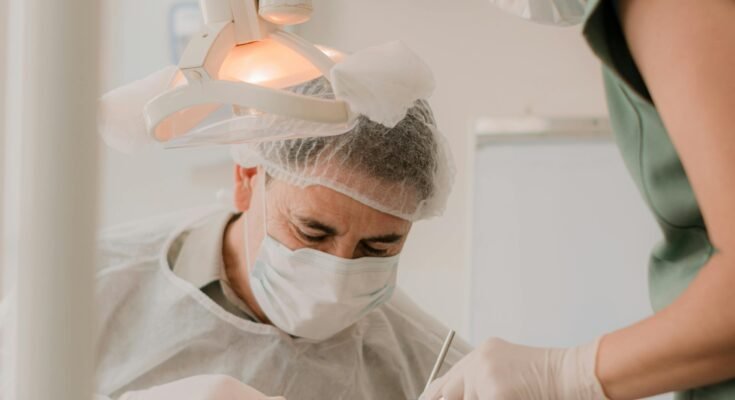The Primary Determinant of Your Health
Oral health is not just a pretty smile but rather an important aspect of your well being and quality of life. Oral well-being impacts physical activities like eating and talking as well as social activities, unaccompanied by pain or shame. However, a beautiful smile leaves an impression and caring for it also means preventing diseases, improving health and making healthy choices. Let’s explore the importance of oral care and how it can be given priority.
The Significance of Mouth Hygiene
Link to Overall Health Status
The state of your oral health is interdependent with your physical well being. Oral cavity diseases like periodontitis have shown to have damaging cardiovascular, cerebrovascular, diabetic, and respiratory effects. This relationship emphasizes the need to manage oral bacteria as they may cause problems in other systems if they are not controlled.
Facilitating Nutrition and Digestive Function
With strong teeth and gums, a person is able to chew and break down food accurately. However, the inverse is also true where poor oral cavity hygiene causes pain which leads to eating difficulties which will affect nutrition and energy levels. With a well-maintained mouth, one can be able to eat well without facing any restrictions.
Enhancing Self-Esteem and Emotional Resilience
As with any other aspect of your well-being, your smile can build your self-esteem and self-confidence allowing you to have constructive social engagements without fear. It also eliminates all anxieties about bad breath (halitosis) and any visible plaque, as well as decay so that one can take part in delightful conversations without any embarrassment.
Continuity of Care and Prompt Diagnosis
Maintaining optimal oral hygiene as well as having the required level of dental care, such as regular visits to the dentist, assists in avoiding cavities, gum disease as well as other inflammatory and infectious disorders of the mouth. Besides, during the routine dental procedures, there is also the possibility of noticing the precursory signs of chronic conditions like diabetes or some types of cancer, and so, oral health is an important component of healthcare.
Increasing the Level of Confidence and Emotional Health
A glowing and healthy smile increases one’s self-confidence and allows for better social interaction. It also addresses the concerns about halitosis and or cavities making it possible to connect without too much insecurity for meaningful interactions.
Disease Prevention and Early detection
Regular visits to the dentist and adherence to principles of oral sanitation make dental caries, periodontal diseases, oral cavity microbial infections and to some extent oral cancers impossible. Indeed, oral health care is important in the larger picture of health care because it includes preventive medicine – only with a focus on the eradication of pathological conditions of the mouth, for example, a dentist who examines the oral cavity can detect chronic systemic diseases, including diabetes or malignancies during checkups.
How to Keep Your Mouth Healthy
- Brush and Floss Your Teeth
Brush your teeth at least two times a day with fluoride toothpaste and floss your teeth at least once in a day. Such practices prevent caries and diseases of the gums due to plaque accumulation.
- Use A Mouthwash
Antimicrobial mouthwash (mouth rinses) or fluoride mouthwashes demonstrably target plaque, kill bacteria, and strengthen teeth so they are a good complement to brushing and flossing.
- Go To Your Dentist Often
Regular dentist appointments (every 6 or at most 12 months) are important in that they permit tooth professionals to check and clean the mouth and find solutions to the problems detected in the early stage of the disease. Such appointments for check-ups should be emphasized, as they are essential parameters for effective management of oral hygiene.
- Get In Shape
You have to stop eating sugary and acidic food because they can wear out your enamel and bring cavities. Go for food substances that fortify teeth and gums such as fruits, vegetables, dairy products and other sources of whole grains.
Drinking enough water and swallowing enough saliva will help you maintain adequate moisture in your mouth. A lack of moisture will lead to an increased possibility of decay and halitosis in individuals.
- Reduce alcohol and tobacco use
Oral hygiene should be maintained to prevent risks like gum infections, oral cancer, and tobacco staining caused by smoking or chewing tobacco. Oral problems caused by alcohol will also be exacerbated by alcohol misuse.
Care for Your Teeth
You have to use mouth guards for protection if you participate in any sports or practices of grinding teeth while sleeping. Damaging of teeth is as critical as the cleaning of teeth.
Benefits of a Healthy Mouth
One avoids pain and discomfort: Brushing properly prevents toothache, infection, and gum disease.
Improved Life Expectancy: Practicing good oral hygiene may increase life span by lowering systemic risks.
Enhances quality of life: With a healthy mouth, you can eat, speak and have no fears to smile.
Final Thoughts :
Good oral hygiene is a lifetime investment that will pay off in greater general health and well-being. Taking care of your teeth by brushing, a balanced diet and seeing your dentist regularly is great way to avoid oral issues that would detract from an otherwise healthy smile. Your mouth is a reflection of your body: if you take care of it, it will take care of you in return!

